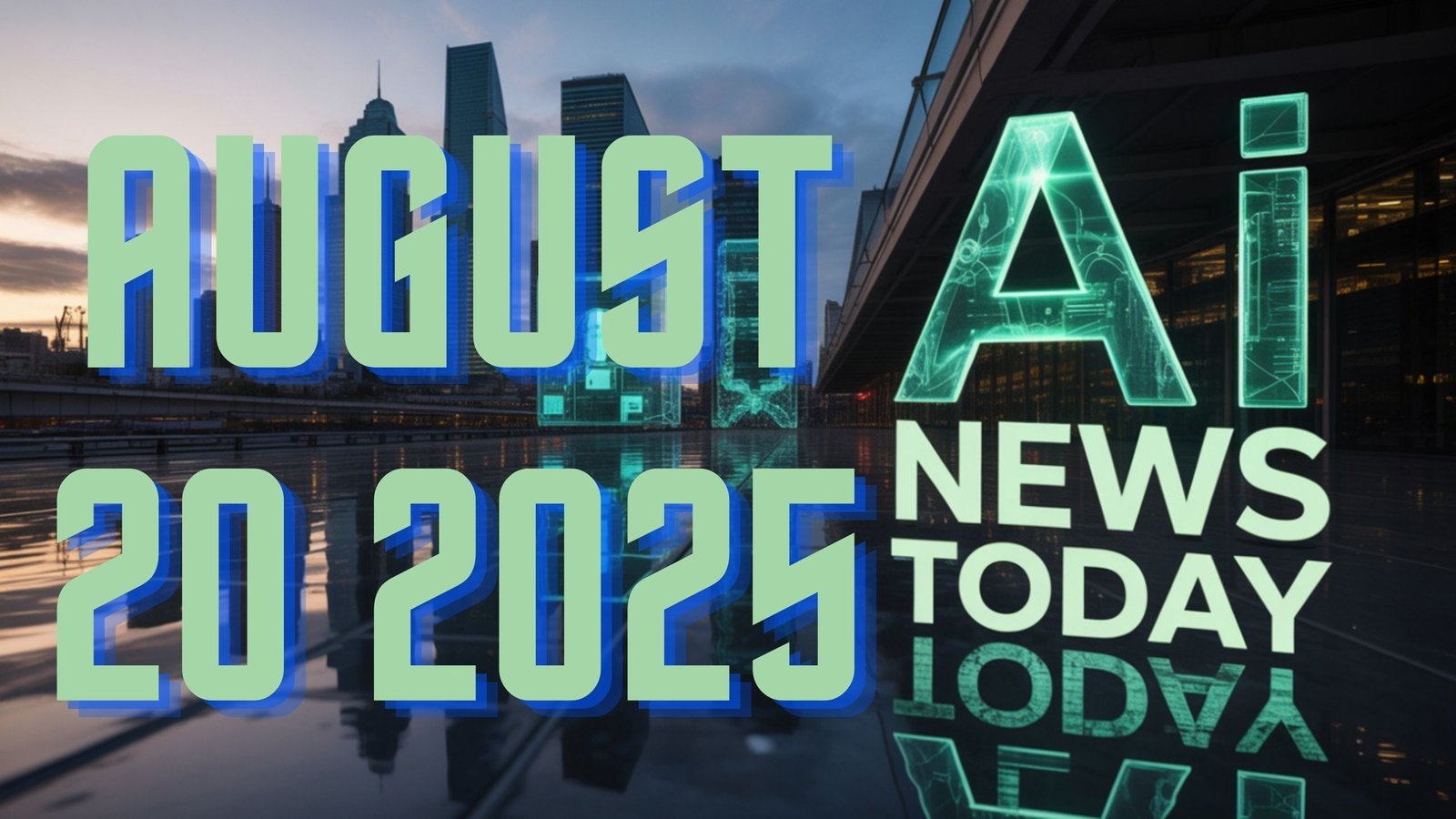AI News Daily — USA (Wednesday, August 20, 2025)– Artificial Intelligence (AI) continues transforming industries across the United States, driving regulatory attention, enterprise adoption, and consumer-facing innovations. Today’s developments span federal enforcement initiatives to groundbreaking healthcare deployments and enterprise spending shifts. Below is a detailed breakdown of the most important AI news in the U.S. as of Wednesday, August 20, 2025.
U.S. Department of Justice Prepares AI-Focused Enforcement Initiative
The U.S. Department of Justice (DOJ) is reportedly preparing a sweeping AI enforcement strategy that targets deceptive claims surrounding AI-powered products and services. The initiative is expected to emphasize:
- Substantiation standards: Companies will need concrete evidence when advertising AI capabilities. Vague claims like “AI-powered efficiency” or “smarter with AI” may soon be scrutinized unless measurable proof is provided.
- Disclosure obligations: Firms deploying AI-generated content may be required to disclose what portions of their material are created or influenced by AI systems.
- Consumer protection priority: With AI tools entering everyday consumer products, the DOJ aims to protect buyers from misleading claims and ensure compliance with federal truth-in-advertising standards.
If enacted, this initiative could reshape how technology firms market AI features, forcing greater transparency across industries ranging from consumer electronics to software platforms.
Federal Trade Commission Drafts Guidance on AI Labeling and Endorsements
The Federal Trade Commission (FTC) is also advancing its stance on AI regulation, with internal drafts circulating that propose:
- “AI-Made” labeling requirements for generative platforms producing text, images, or video.
- Stricter rules for influencer and brand endorsements when AI-generated media is used, ensuring audiences are not misled about authenticity.
- Accountability frameworks for marketplaces where creators use AI, requiring disclosures to safeguard consumers and advertisers.
This step reflects growing concerns about synthetic content manipulation in advertising, creator marketplaces, and e-commerce. If finalized, these rules may push platforms to adopt trust labels that distinguish human-generated from AI-generated work.
U.S. Cloud Providers Strengthen Sovereign AI Offerings
The largest U.S. cloud providers—including Microsoft, Amazon, and Google Cloud—are advancing sovereign AI solutions for highly regulated industries such as finance, healthcare, and government. Key developments include:
- Data residency commitments ensure that customer data remains within U.S. jurisdictional boundaries.
- Detailed model activity logging, providing auditable trails for compliance and risk management.
- Customer-controlled encryption keys enable enterprises to maintain authority over sensitive data while leveraging AI services.
This movement reflects mounting pressure from policymakers and regulators, who demand greater transparency and control in the AI supply chain. For enterprises, sovereign AI is increasingly a must-have feature when selecting cloud service providers.
AI Clinical Scribes Transform U.S. Healthcare Networks
A leading U.S. hospital network has announced the nationwide deployment of an AI-powered clinical scribe across its emergency departments. After a successful multi-month pilot, the rollout demonstrated:
- Reduced documentation time for physicians and nurses.
- Improved clinician satisfaction, allowing staff to focus on patient care instead of manual data entry.
- Strict patient data safeguards, including compliance with HIPAA and real-time human-in-the-loop review to ensure quality.
This move signals a significant leap for AI in healthcare, as hospitals nationwide face staffing shortages and increasing patient loads. By automating repetitive documentation, AI scribes help boost efficiency, reduce burnout, and enhance patient outcomes—while keeping clinicians firmly in control.
Enterprise AI Spending Outlook Shifts Toward Automation
Analysts report that large-cap U.S. enterprises are shifting their software budgets more aggressively toward AI copilots and automation pilots. Key insights from Q4 pipeline checks suggest:
- AI copilots are becoming central tools in productivity suites, automating tasks from code writing to financial analysis.
- Agentic automation pilots are accelerating, with companies experimenting in customer service, operations, and compliance management.
- IT refreshes are slowing, as many CFOs redirect funding toward AI initiatives instead of traditional hardware or infrastructure upgrades.
This reflects a paradigm shift: enterprises are no longer simply experimenting with AI—they are reorganizing budgets to integrate AI into core operational strategies.
Regulatory Pressure Meets Corporate AI Expansion
The combined weight of DOJ enforcement, FTC guidance, and enterprise adoption trends paints a clear picture: AI is now too central to remain lightly regulated. Federal oversight is set to tighten just as corporations expand AI deployments in healthcare, cloud computing, and automation.
For businesses, this convergence means:
- Greater compliance burdens in advertising, product labeling, and data governance.
- More scrutiny on AI-related consumer claims.
- Increased competition in AI services as cloud providers strengthen sovereign AI capabilities.
Enterprises that can balance innovation with regulatory compliance will have the edge in this next phase of AI growth.
Implications for U.S. Consumers and Businesses
These moves promise more transparency and trust in AI-driven services and products for consumers. AI-generated content in advertising may soon carry more transparent labeling, while healthcare AI deployments will continue to prioritize safety and accountability.
For businesses, the message is equally strong: compliance-first AI adoption is the future. Those who integrate transparent, auditable, and secure AI practices into their workflows will be better positioned to thrive under upcoming enforcement regimes.
The Road Ahead for AI in the United States
As of August 2025, the trajectory of AI in the U.S. is marked by innovation and accountability. Regulators are moving quickly to establish standards, enterprises are reallocating budgets toward automation and copilots, and healthcare providers are embracing AI to ease clinical burdens.
The coming months will likely bring:
- Formal DOJ announcements on deceptive AI claims enforcement.
- Public FTC guidelines for labeling AI-generated content.
- Expanded sovereign AI offerings from cloud providers.
- Wider adoption of AI scribes and assistants in healthcare.
- Continued budget reallocation toward AI pilots across industries.
In short, AI’s integration into U.S. society is accelerating, and regulators and businesses are preparing for a future where transparency, trust, and compliance are as essential as innovation.

Selva Ganesh is a Computer Science Engineer, Android Developer, and Tech Enthusiast. As the Chief Editor of this blog, he brings over 10 years of experience in Android development and professional blogging. He has completed multiple courses under the Google News Initiative, enhancing his expertise in digital journalism and content accuracy. Selva also manages Android Infotech, a globally recognized platform known for its practical, solution-focused articles that help users resolve Android-related issues.




Leave a Reply